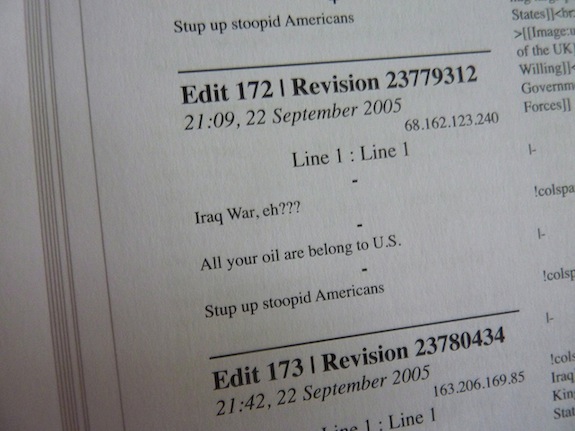The Ten Most Controversial Articles on Wikipedia Might Surprise You
One researcher has quantified the most controversial Wikipedia entires of all time in ten different languages

Image: STML
Wikipedia is a great repository of information. It can tell you about physics, the history of the weird Aerican Empire and how people in Michigan turn left. It can also tell you a lot about sexism, conspiracy theories and what we, as humans, like to fight about. (Or, at least, what mostly white dudes like to fight about.)
One researcher has quantified the most controversial Wikipedia entires of all time in ten different languages. Taha Yasseri is working on a book about Wikipedia and recently published a draft of his chapter on the most controversial topics. He and his team created a formula to quantify controversy. It focused on what are called “reverts”—times when one editor undoes another editor’s changes entirely. The team then downloaded all of the articles available to them in March of 2010 and calculated this controversy value for each.
What came out on top? In English, the top ten most controversial topics were:
1. George W. Bush
2. Anarchism
3. Muhammad
4. List of WWE personnel
5. Global Warming
6. Circumcision
7. United States
8. Jesus
9. Race and intelligence
10. Christianity
Some of these you might expect. Religion and race are some of the most controversial topics around. But others are a little more surprising. Anarchism and circumcision certainly are controversial, but would you have guessed they’d be in the top ten? And the list of World Wrestling Entertainment people?
Other languages had quite different results, as well. Here are the top ten most controversial Spanish language pages:
1. Chile
2. Club America
3. Opus Dei
4. Athletic Bilbao
5. Andrés Manuel López Obrador
6. Newell’s Old Boys
7. FC Barcelona
8. Homeopathy
9. Augusto Pinochet
10. Alianza Lima
So sports might be a bit more controversial in the Spanish speaking world than they are for English speakers. The authors also looked at how different entries might group together. They found three main groups: English, German, French and Spanish all seemed to generally hang together. Czech, Hungarian and Romanian made up the second group, and Arabic, Persian and Hebrew the third. The authors write:
Ultimately by visualizing the controversy in Wikipedia, we’re able to see both topics that appear to have cross-linguistic resonance (e.g. Arab-Israeli conflict), and those of more narrow interest such as the Islas Malvinas/Falkland islands article in the Spanish Wikipedia. The data presented here therefore offers a window into not just the topics and places that different language communities are interested in, but also the topics that seem worth fighting about.
At least worth fighting about to Wikipedia editors.
More from Smithsonian.com:
How Many Women Does It Take to Change Wikipedia?
This is a Real Time Map of Wikipedia Changes
/https://tf-cmsv2-smithsonianmag-media.s3.amazonaws.com/accounts/headshot/Rose-Eveleth-240.jpg)
/https://tf-cmsv2-smithsonianmag-media.s3.amazonaws.com/accounts/headshot/Rose-Eveleth-240.jpg)